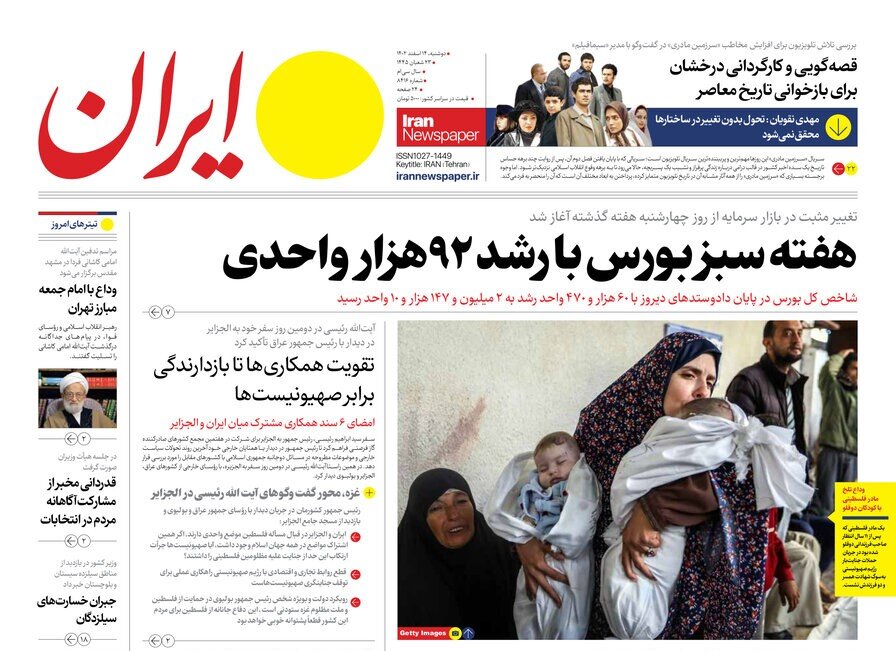The lies of anti-revolution about the flood of Sistan and Baluchestan

TEHRAN - In a note, the Iran newspaper addressed the lies of the opposition about the flood of Sistan and Baluchestan and wrote: The Iranian opposition started falsifying and making lies again.
Following last week's rains in Sistan and Baluchistan, floods caused damage to people in some areas of this province. In the meantime, the figures of the Iranian opposition sought to exploit the flood in Sistan and Baluchestan by lying and falsifying images and news as usual. They propagated images of the oppressed Palestinian children as the flooded children of Sistan and Baluchestan, but these Iranian opposition groups and figures have been supporting the Zionist terrorist regime since the beginning of the war and never spoke about the oppressed people of Palestine. Basically, the use of old, fake and archival images of the deprivations of the people of Afghanistan, Pakistan, Iraq and now the oppression of Palestine has become a strategy of the Iranian opposition to create lies.
Etemed: Iran's new lever to get out of the nuclear deadlock
As regards Iran's nuclear issue, Etemad pointed out: Bloomberg has claimed that Iran's decision to reduce its uranium stockpile from near bomb grade in favor of producing specialized fuel for advanced civil nuclear reactors may be a negotiating tactic with the West, especially the United States. It seems that nuclear diplomacy with Iran will basically be stopped until after the end of the U.S. presidential election. Inside Iran, everyone is waiting for Iran's strategy and plan to be determined to advance the negotiations. However, the United States is looking for a new tactic to put more pressure on Iran regarding its nuclear program. Some former United States officials said that Iran's recent actions to reduce its enriched uranium stockpile contain a positive element. According to Robert Kelly, there should be a high-priority diplomatic effort to allow Iran to produce and sell all of its diluted stockpiles under the usual IAEA safeguards.
Javan: The Persian Gulf Cooperation Council is not in a position to comment against Iran
In an article, Javan addressed the recent statement of the Persian Gulf Cooperation Council against Iran and said: We are going to witness an important event in Jeddah at the headquarters of the Organization of Islamic Cooperation regarding Palestine. This is the second meeting of the ministers of Islamic foreign affairs, which will be held extraordinarily, and both meetings are the product of the diplomatic efforts of Iran and some other member countries of this organization. Due to the special position and importance of the organization, it was expected that in this period of 5 months crimes of the Zionist regime against the people of Gaza witnessed effective action by this organization. Unfortunately, we did not witness that the Organization of Islamic Cooperation plays its role in supporting Palestine as it should. Regarding the claim made by some Persian Gulf countries regarding the right to use the Arash gas field, Iran has repeatedly announced its principled positions based on international laws and unilateral claims will not create any rights for the claimant. Iran's view in relations with its neighbors is to try to build a positive and constructive atmosphere and emphasize common and friendly issues, and such issues in unilateral statements are not acceptable in any way.
Ham Mihan: The Islamic Republic of Iran and its entry into the future world system
In a commentary, Ham Mihan dealt with the issue of Iran's readiness as an effective actor in the future world system and said: For several years, the authorities of the Islamic Republic of Iran have been promising a change in the world order and transition from a unipolar system led by the United States to a multipolar system. According to Raisi, we are in a decisive historical period. The world is changing and transitioning to an emerging international order, and this path is irreversible. What is key to the new international order is to abandon global dominance and replace it with regional orders and cooperation. During the past 45 years, different governments and the country's foreign policy system have been united on the implementation of some principles in foreign relations. Issues such as anti-Americanism, support for Palestine, and support for regional resistance groups are among the issues that have been more or less respected by different governments after the revolution. In some cases, the principles of foreign policy did not change with the change of governments, but in some cases, we saw intermittent and serious changes. It can be said that the main strategies of foreign policy existed from the past and have not changed fundamentally, but tactics that are even contradictory to those main strategies have been implemented.
Leave a Comment